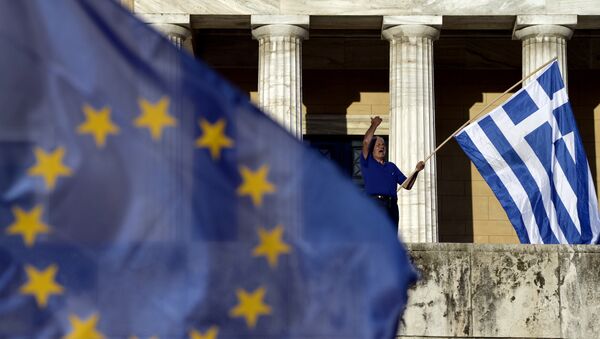With of a 229 in favor, 64 against, and 6 neglecting to vote, the Greek parliament has approved the bailout proposal.
Former finance minister Yanis Varoufakis voted to reject the deal. Given that Varoufakis had earlier compared the package to the Treaty of Versaille, his decision was not surprising, but could potentially lead to his ouster as a Syriza MP. House Speaker Zoe Konstantopoulou also rejected the proposal, after earlier warning that it could lead to social genocide.
While Greek Prime Minister Alexis Tspiras called the bailout package "irrational," he had nevertheless actively lobbied parliament to approve the proposal to prevent Greece's exit from the eurozone.
"The Greek people are fully conscious and can understand the difference between those who fight in an unfair battle and those who just hand in their weapons," Tsipras told parliament just before the vote.
As a part of the 86 billion euro bailout, the Greek government will have to enact strict austerity measures. These include a top VAT rate of 23% to take in processed foods, 13% rate to cover fresh food, energy bills, and water, and 6% rate for medicines and books. It will also raise the corporate tax rate from 26% to 29% and install a luxury tax on cars, boats, and swimming pools. Early retirement for Greek citizens will also be affected.

Expressing their opposition to the austerity measures, demonstrators gathered throughout Athens earlier on Wednesday, leading to clashes between protesters and riot police. Law enforcement deployed tear gas and pepper spray, while protesters threw Molotov cocktails and rocks. Roughly 40 protesters were detained by police.
Over half of the members of the central committee of the ruling Syriza party signed a statement condemning the bailout, saying it amounted to a coup against Greece by European leaders.
"It may pass through parliament," Greek energy minister Panagiotis Lafazanis said in an earlier statement. "But the people will never accept it and they will be unified in their fight against it."
Agreed to by eurozone leaders in Brussels on Monday, the proposal was rejected by the International Monetary Fund, who considered the austerity measures did not go far enough.



